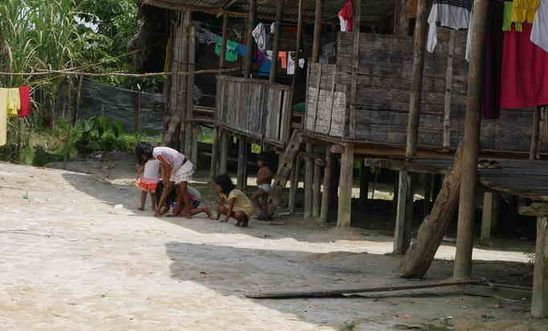
Press releases
Colombia: Indigenous Peoples will die from COVID-19 or hunger if state does not act immediately

Despite government promises, indigenous communities have received no support since the lockdown was enforced three weeks ago
‘If the authorities do not take urgent action, Indigenous Peoples will find themselves facing two unthinkable paths: starve or die of the pandemic’ - Fernanda Doz Costa
Colombia must urgently take measures to guarantee the rights of Indigenous Peoples in the face of the COVID-19 pandemic, Amnesty International said today.
These measures - including the rights to health, water and food - must be coordinated with each indigenous community, respecting their right to autonomy.
Against the background of a global pandemic, President Iván Duque stated that authorities would deliver food and money to the country’s most vulnerable people. But three weeks after lockdown was imposed, indigenous communities in the departments of Casanare, Vichada and Meta have informed Amnesty that they have received no support from the government, despite their strict compliance with isolation measures.
Fernanda Doz Costa, Deputy Americas Director at Amnesty International, said:
“Indigenous Peoples in Colombia are on high alert. The government is implementing preventive measures for COVID-19 without adequately guaranteeing their fundamental rights. Historically they have not had access to health, water or food and in the context of this pandemic, this situation is much more serious because they do not have the sanitary and social conditions to deal adequately with COVID-19.
“The Colombian authorities must adopt additional social protection measures for those parts of the population that are in a particularly vulnerable situation and are more likely to contract COVID-19. If the authorities do not take urgent action, Indigenous Peoples will find themselves at a crossroads facing two unthinkable paths: starve or die of the pandemic.”
Healthcare: Remote and expensive
To date, the National Indigenous Organisation of Colombia (ONIC) has reported four confirmed cases of COVID-19 among the Yukpa Binational People and the Pasto People, and one possible case among the Eperara Siapidara People. Access to health centres from most of the territories of these Indigenous Peoples is very expensive because of their remoteness and inaccessibility.
The Claretian Norman Pérez Bello Corporation told Amnesty about the difficulties posed by the mandatory quarantine for the way of life and livelihoods of more than 3,000 Indigenous People in the departments of Casanare, Vichada and Meta. In these semi-nomadic communities, isolation measures increase their vulnerability because they cannot access their means of subsistence and move within territories. Moreover, these are minority ethnic populations believed to be on the brink of physical and cultural extinction.
Concern for Indigenous Peoples living in settlements on the outskirts of towns and cities is significant too, as they have no means of growing their own food and survive by working in informal jobs, which they are currently unable to do. Many of these communities do not have access to clean water or hygiene products, making personal cleanliness to prevent COVID-19 infection impossible.